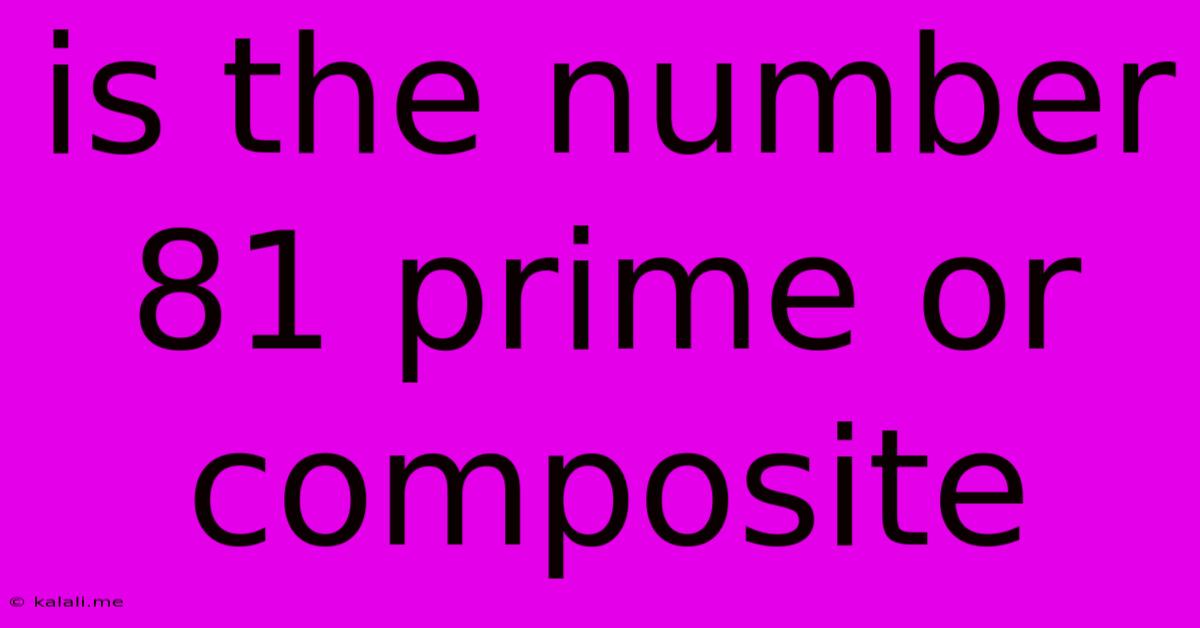Is The Number 81 Prime Or Composite
Kalali
May 09, 2025 · 2 min read

Table of Contents
Is the Number 81 Prime or Composite? A Comprehensive Explanation
Meta Description: Learn whether 81 is a prime or composite number. This article provides a clear explanation, explores the definitions of prime and composite numbers, and offers examples to solidify your understanding.
Determining whether a number is prime or composite is a fundamental concept in number theory. Understanding this distinction is crucial for various mathematical operations and applications. This article will definitively answer the question: is 81 prime or composite? We'll break down the concepts and show you how to determine the nature of any given number.
What are Prime and Composite Numbers?
Before we tackle the question regarding 81, let's define our terms:
-
Prime Numbers: A prime number is a natural number greater than 1 that has no positive divisors other than 1 and itself. In simpler terms, it's only divisible by 1 and itself. Examples include 2, 3, 5, 7, 11, and so on.
-
Composite Numbers: A composite number is a natural number greater than 1 that is not prime. This means it has at least one divisor other than 1 and itself. Examples include 4 (divisible by 1, 2, and 4), 6 (divisible by 1, 2, 3, and 6), 9, and so on.
-
The Number 1: The number 1 is neither prime nor composite. It's a unique case in number theory.
Determining if 81 is Prime or Composite
To determine whether 81 is prime or composite, we need to find its divisors. Let's check:
- Is 81 divisible by 2? No.
- Is 81 divisible by 3? Yes (81 / 3 = 27).
- Is 81 divisible by 4? No.
- Is 81 divisible by 5? No.
- Is 81 divisible by 6? No.
- Is 81 divisible by 7? No.
- Is 81 divisible by 8? No.
- Is 81 divisible by 9? Yes (81 / 9 = 9).
Since 81 is divisible by 3 and 9 (besides 1 and itself), it has more than two divisors. Therefore, 81 is a composite number.
Further Understanding Composite Numbers and Factorization
Finding the prime factorization of a composite number is a common task in mathematics. For 81, the prime factorization is 3 x 3 x 3 x 3, or 3<sup>4</sup>. This means that 81 can be expressed as the product of prime numbers. Understanding prime factorization is vital in various mathematical fields, including cryptography and algebra. This process helps in simplifying complex calculations and solving equations.
Conclusion
In conclusion, the number 81 is definitively a composite number, not a prime number. Its divisibility by 3 and 9 (in addition to 1 and itself) confirms this. Understanding the difference between prime and composite numbers is a cornerstone of elementary number theory, with applications extending to more advanced mathematical concepts. Remember, a number is composite if it has more divisors than just 1 and itself.
Latest Posts
Latest Posts
-
Cuanto Es 19 Farenheit A Centigrados
May 09, 2025
-
How Many Cups Is 3 4 Pint
May 09, 2025
-
How Tall Is 170cm In Inches
May 09, 2025
-
How To Graph A No Solution
May 09, 2025
-
Factoring A Quadratic With Leading Coefficient
May 09, 2025
Related Post
Thank you for visiting our website which covers about Is The Number 81 Prime Or Composite . We hope the information provided has been useful to you. Feel free to contact us if you have any questions or need further assistance. See you next time and don't miss to bookmark.